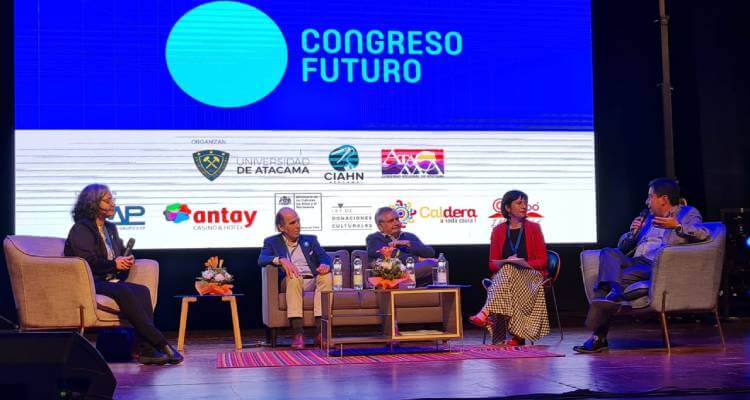The region’s natural heritage, its fossil, geological and astronomical wealth, as well as its scientific potential within the framework of the regional development strategy, and in the context of global environmental challenges, will be central issues in the region.
The keynote address by astronomer and National Science Award recipient Dr. Mario Hamoy gave the go-ahead for Congreso Futuro, one of Latin America’s premier human science outreach events, being held for the first time in the Atacama Region between January 17-19.
This initiative has been organized since 2011 by the Commission on Future Challenges of the Senate of the Republic of Chile, joined locally by the Atacama Regional Government, the Regional Foundation for Paleontology CIAHN ATACAMA, CMP and the University of Atacama.
The main themes around which the program revolves are ecology, climate change and paleontology, understanding the Atacama as a natural laboratory; A privileged area of scientific research on a global level, its biodiversity and paleontological, geological and astronomical heritage can lead to unexpected discoveries capable of revolutionizing current concepts about the evolution of life on this planet. From this perspective, the scientific potential of the Atacama is envisioned as a potential “without real boundaries”, as stated in the national motto of Congreso Futuro 2023.
In this regard, Atacama Governor Miguel Vargas Correa stated, “We want it to be a great event, for people to come together to think, discuss and propose on scientific issues, scientific research and regional development. Important topics for the Atacama such as astronomy, paleontology and the effects of climate change in a territory like ours. There is no doubt how the floods, for example, will affect in 2015 and 2017 that must call us to action. First, know the phenomenon well, and then take measures to transfer security to the population. Geology and flowery desert. The Atacama is a natural laboratory, and here there is everything to do “We have over 3,000 fossil sites, which is a huge comparative and competitive advantage that we have to leverage within an alliance between the public world and the private world. We’re going to form, and we already have the proposal, a ‘Regional Science and Technology Committee’, and we want to build great agreements from there.” .
The authority added, “In the first conferences the issue of the astronomical development of the Atacama was raised, and how important it is to have an observatory, as a great project. Well, let’s see if it can be built and what we need to do, and how we have to articulate that so that a project like this is possible. Also Paleontology and the need for a paleontological museum, the investments we have to make in the paleontological park, the protection we have to give to different sites; like the Pinte site or the La Ballena hill in the municipality of Caldera. I think there is a lot to do and in this there is no one but Necessary, from the scientific academy in schools, from the work we have to do in universities, from the role of public services, as well as private companies, I think we can build a great project around science and research in the Atacama.”
CIAHN ATACAMA Regional Paleontology Executive Director, Pablo Quilodran emphasized, “We have luxury exhibitors. The fact is a unique opportunity for internationally renowned scientists of the region such as Prof. Bruno David, Yves Leconte and also national scientists, national award winners such as Mario Hamoy, Riccardo Rossi. About what They will talk to us?They will talk to us about how the Atacama has a natural heritage that can be a driver of development, but also how this has been implemented in other places.For example, I will stop at the case of Cape Horn, where Professor Riccardo Rossi works in the subantarctic archipelago, with A think tank, and from there, it brings in very important investments.In this sense, we think it’s a good mechanism to be able to think about the Atacama from astronomy, from paleontology, from flowery desert, from climate change, that is, we have a lot of opportunities and that’s what we’re going to talk about About these three days here. At the Atacama Cultural Center; Tuesday 17th, Wednesday 18th and Thursday 19th. Don’t forget the closing in the caldera on Thursday 19th at 7:00pm.”
It should be noted that the Congress of the Future 2023 in Atacama, is being implemented thanks to the collaboration of the Compañía Minera del Pacífico (CMP), which always seeks to participate in cases of social interest and which contributes to the development of the communes in which it operates. , joined forces with the regional government, Atacama University, and CIAHN to implement this project.
Francisco Carvajal, general manager of the company, noted that “CMP is an important part of this conference of the future in Atacama, because we also want to show ourselves in an innovative way and to be able to coexist in harmony with our territory and the ecosystem. In this way, we contribute to the launch This vision of our beloved Atacama region for the following years, and thinking about what our region will be like and how CMP can accompany this vision for the future.”
The Executive Director added: “We are very happy with what is happening today and the following days in the conference, we are not only present as sponsors, but also actively participate in the activities, specifically in the grand finale of next Thursday in the Estación de Caldera Cultural Center, where we will display a wonderful map, showing Monuments, phenomena and important parts of the history of the Atacama. We therefore invite the entire Caldera community to join us and be present in this great achievement, especially to enjoy these holidays in the municipality of Puerto.”
The Dean of the University of Atacama, Forlin Aguilera, stated that this is “an iconic date, since for the first time, since 2011 when the future conference took place, we have it in the Atacama region, but with the specificity that in the region, this will be rolled out at the regional level in order to continue to imbue Democracy over knowledge, to further democratize science, with the aim of fulfilling, as a regional university and a state, one of our great goals and our great challenges.As I indicated in my opening words, we must be the engine of development for our region, and in this sense, we must cultivate the various fields of knowledge in order to generate science and generate Knowledge, but with the specificity of this natural laboratory. That it is the Atacama that will bring us to us; that is the idea, and here we have a huge responsibility that we must continue to develop together in our region. “
Future questions and approaches
Paleontologist and marine biologist Dr. Bruno David, president of France’s National Museum of Natural History, will hold his exhibition this Wednesday, January 18th at 10:30 a.m., asking Congress the troubling question “Are we on the verge of a sixth extinction?”
Regarding his perception of climate change, and how one can learn from the past to counter what is happening in the present, he said: “If we look at the past, in particular, 500 million years ago, we see that the earth has gone through different climatic stages, some warm periods, Warmer than today, others are cooler. In fact, we are now in a cold period. The big difference between climate changes in the past is the speed with which they occurred. In terms of warming, cooling takes hundreds of thousands of years, and the big difference is that this change is rapid very presently, and it is likely to hinder life adaptation that may have occurred in the past.” His assistant explains, “Dr Bruno David is very pessimistic about what is to come. Climate change is having tremendous momentum, and while effective action needs to be taken, which is not currently the case, global warming will continue to progress, and increase over the next few thousand years, at least.” .
Regarding the paleontological significance of the Atacama Desert, the head of the National Museum of Natural History of France stated, “It is first and foremost a cultural heritage, but historical and, of course, scientific, because it is like a book that tells us how life dealt with this change in the past, and it obviously allows us to By taking that knowledge, knowing that history and trying to apply it, using it to face the current situation, hence the great value of the deposits that are so rich in fossils.”
Close under the stars
The regional meeting takes place at the Atacama Cultural Centre, in Copiapo, where anyone wishing to attend can register at the following link https://forms.gle/2xm1YJQTpDacq4gBA before or at the same place as the event.
The closing day of sunset on Thursday, January 19, will take place outside the old Caldera train station, today the Estación Cultural Center, located a few meters from the beach, is where the closing event will take place, with an outdoor audiovisual performance of music by the Atacama Philharmonic Orchestra.
On this day, which will start at 7:00 pm, the Future Questions activities are highlighted, where girls and boys of the Caldera Museum of Paleontology Academy of Sciences will have the opportunity to present their research projects and ask their questions. To great Chilean scientists, including National Science Prize Laureate Mario Hamoy.

“Social media evangelist. Student. Reader. Troublemaker. Typical introvert.”


:quality(85)/cloudfront-us-east-1.images.arcpublishing.com/infobae/7TXNTX4Z6ZADNGBBYTUT45QETM.jpg)
:quality(85)/cloudfront-us-east-1.images.arcpublishing.com/infobae/TR43PX4FQRCGJOYTK6DVVHHXGE.jpg)


More Stories
National Academy of Medicine and PAHO present reports of the Colombia General Physician Competency Forum – PAHO/WHO
Academic excellence in medical sciences is recognized at Granma.
Medical simulation has revolutionized the training of doctors in the country.